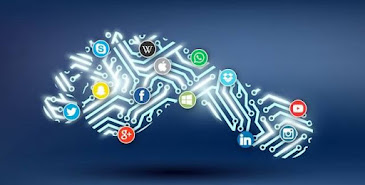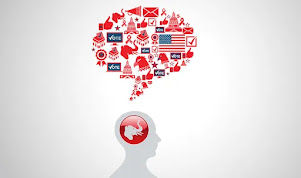My Relationship With Technology
Over the decade's technology has evolved from being used for survival and hunting to being used for pleasure. As technology has changed, so has the way we communicate. Technology started with petroglyphs which are rock carvings made when you continuously peck at a rock using a stone chisel and a hammerstone. Technology has evolved into automatic cars, drones, cloud computing, Apple iPhones, flash drives, and more.
Today, technology has become a significant part of our everyday lives; for some, it has even taken over. These little devices hold so much power over us, teaching us new information, connecting us to others, and being a part of our everyday lives. I have always found technology fascinating; it has been a part of my life since a very young age. From using things such as iPods, Netendo Switch, flip phones, Bluetooth, and computers to now Apple Phones and Alexias, ideas that were once expressed with words directly can be spoken through different media types. Growing up, I had access to various technology platforms; however, I don't necessarily perceive this as positive. My phone and computer are a part of me, they not only contain an abundance of information, but they hold essential information from almost every aspect of my life. Whether this includes my contacts, pictures, school work, passwords, money, etc., I would lose a piece of me if I lost my phone. A study taken in 2023 states that globally, the typical person averages 6 hours and 58 minutes of screen time per day; however, the average American spends 7 hours and 4 minutes of screen time per day. Not only is it crazy that almost 10 hours of our 24-hour days are taken up by looking at these little devices, but after reviewing my screen time, I was saddened to find that my average was 5 hours and 32 minutes. What makes it worse is that 95% of the time I spent on my phone did not do anything productive; it was just me scrolling through social media and texting with friends.There have been multiple points in my life where I have considered deleting all my social media off my phone for various reasons. One reason is that it's not helping me in any way, whether as a student, a friend, or a person; it's holding me back. The hours I spend scrolling through social media or watching Netflix on my television could be easily turned into hours I spend doing homework or improving myself physically and mentally. However, I have not gotten rid of social media/ technology because it provides some positive aspects and has become such a significant part of our society that I would become so disconnected from our world and what it has evolved to.
Although there is so much negative connotation connected to technology, there is even more optimism. With the help of technology, many of us can stay connected to friends and family who may not live nearby. We can further our knowledge or even learn fun and interesting facts we learned with the internet. It is more accessible when networking when looking for a job, or creating a company. Innovation and productivity have exceeded our expectations, it allows companies to save time on mundane tasks, and most importantly, it has created artificial intelligence.Reliable or No?
It is measured that about 5.07 billion people use the internet daily. This is due to the abundance of information and the ease at which most of us can find said information. Technology has advanced so much that we are updated almost instantaneously when any news or information is released, both publically or privately, because when it comes to technology, there is no such thing as privacy.Digital Footprint
An online footprint is a record of a person's online activity. It shows where one may have been online and any data they have left behind. An online footprint is constantly growing the more you use the internet or social media. For example, if you deliberately post online, create a website for your company, or allow your apps to track your activity, your online footprint will grow. When I googled myself online, I was shocked when I found very little information about myself; the only thing that immediately came up was my LinkedIn. This surprised me with how much I use the internet and because I use other platforms such as Facebook, Snapchat, and Instagram. Although this surprised me, I view it as a very positive thing. This is because if a business were to google search me, the only thing that comes up is what I want to come up with.Videos
In the video FUTURAMA Ride, they are astonished at what the possible future regarding technology holds. Discussing topics such as underwater hotels, self-driven cars, the lunar rover, and moving walkways, the people in this video gawked over what the future held for our society when it came to technology. As many of you may realize, not only have we accomplished all of these, but we have used technology to create even more than was ever imaginable or talked about in this video.
Although the FUTURAMA Ride video mostly discusses what the future or our present holds regarding technological advancements, the "Tears for Fears" video touches more on the concept of people in our society being addicted to our phones and the consequences attached to it. The video stated and even emphasized the idea that phones will always come first and that they will forever be the citizen's main priority, whether that is posting or communicating with others. I sort of agree with this statement. I say this because, yes, I agree that many of us are addicted to our phones, whether that is scrolling through social media or texting our friends. However, I also believe that there is a major positive side when it comes to technology. It helps us stay connected with our peers, meet new people, and even communicate as a community.
Thanks to technology, not only have we advanced as a society, but we have been able to bring attention to things such as news outlets, journalism, companies, and other concepts within this umbrella. Whether people like it or not, technology will always be around. Although there are many negative effects due to technology, we are constantly will be creating new technological advancements that not only benefit our society but also the way we communicate with each other. This means it is essential we not only create a positive relationship with technology, but we learn how to use it to our benefit. Many people are so focused on the negative side of technology that they completely miss the opportunities presented right in front of them. As I stated before, take advantage of these learning opportunities, but always go into them with caution.







































